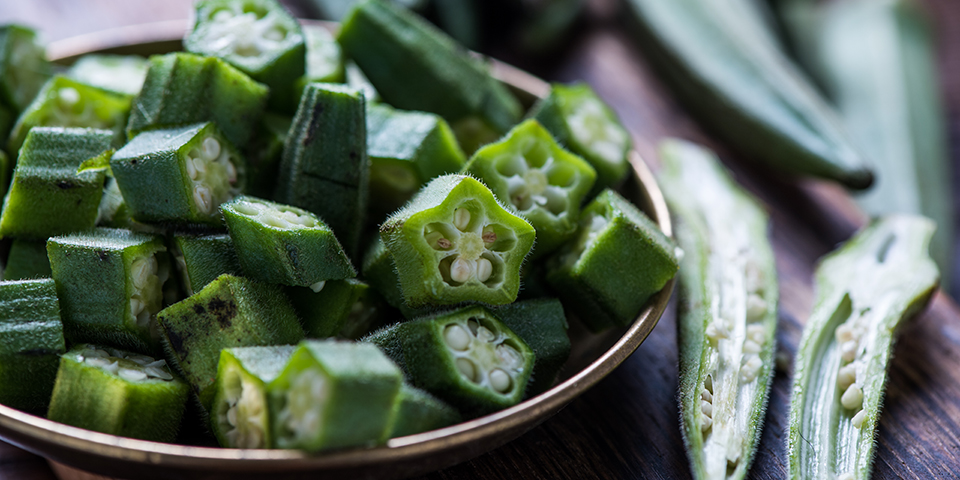Summer’s in full swing, and that means stocking up on all the yummy produce the season has to offer.
And that includes okra. Not yet a fan of okra? You will be soon.
The trick is to learn how to choose the one that’s tender (not stringy or fibrous) — and how to cook okra so it’s not slimy.
These little pods can be packed with flavor if you know how to prepare them.
From roasting and stewing to pickling and sautéing, okra is a surprisingly versatile vegetable.
Keep reading to get the low-down on this vegetable, plus learn how to cook it for maximum enjoyment.
What Is Okra?
You may know okra as “ladies’ fingers” thanks to the pods’ long, slender shape or as a popular addition to gumbo.
It’s commonly stewed in Indian dishes (look for “bhindi” on the menu).
The veggies can be red or green, and they are actually a fruit pod packed with edible seeds.
Since they’re so mild in flavor, okra pods are right at home in spicy dishes, Ginger Hultin, R.D., a Seattle-based registered dietitian and author of Anti-Inflammatory Diet Meal Prep.
While bigger is better with plenty of veggies, that’s not the case with okra.
Choose pods that are no bigger than your thumb; when okra gets too big it develops tough, stringy fibers that aren’t pleasant to eat.
Just 1 cup offers 3 grams of fiber and only 33 calories.
“The fiber helps to keep you fuller for longer,” says Amy Gorin, M.S., R.D.N., a plant-based registered dietitian based in Stamford, Conn.
You know how okra is known for being slimy?
That’s thanks to the soluble fiber it contains, which can help thicken dishes.
Here’s the scoop on the other nutrients you’ll find in 1 cup of raw okra:
- Vitamin C: 23 mg
- Vitamin A: 36 mcg
- Calcium: 82 mg
- Magnesium: 57 mg
- Iron: 0.6 mg
That makes 1 cup of okra an excellent source of vitamin C and a good source of magnesium.
How to Cook Okra
Okra is pretty easy to cook and incorporate into your diet.
It’s especially tasty when added to soup, stews, or rice bowls. You can roast okra, sauté it, stew it, air-fry it, or even pickle it.
“The main challenge with this veggie is that it has a gelatinous texture, so many people choose their preparation methods depending on how much they want to mitigate that aspect,” Hultin says.
The most common way to ditch the slime?
Cut your okra, then cover with white vinegar and let soak for 30 minutes before cooking.
(Just be sure to pat it dry thoroughly!)
Gorin prefers to stew okra. She starts with a can of crushed tomatoes and a bag of frozen okra, then lets the mixture reduce.
This method puts its texture to good use, helping to thicken the dish.
“I serve this over a bed of brown rice with something like tofu or plant-based sausage,” Gorin says.
If you’re new to okra, try roasting it. The pods crisp up nicely!
Here’s how to cook okra in the oven:
Step-by-Step Instructions for Roasting Okra
- Preheat the oven to 450° F.
- Wash and dry a cup of okra per person.
- Trim the stem ends of each pod.
- Place the okra on a baking sheet in a single layer.
- Lightly drizzle the okra pods with 1 teaspoon olive oil and sprinkle with salt. Toss well to coat evenly.
- Roast for 15 minutes, or until they’re tender and have started to brown.
Want more expert nutrition tips and advice? Head over to BODNutrition.com to learn how Beachbody nutrition programs and products can help you lead a healthier lifestyle.






